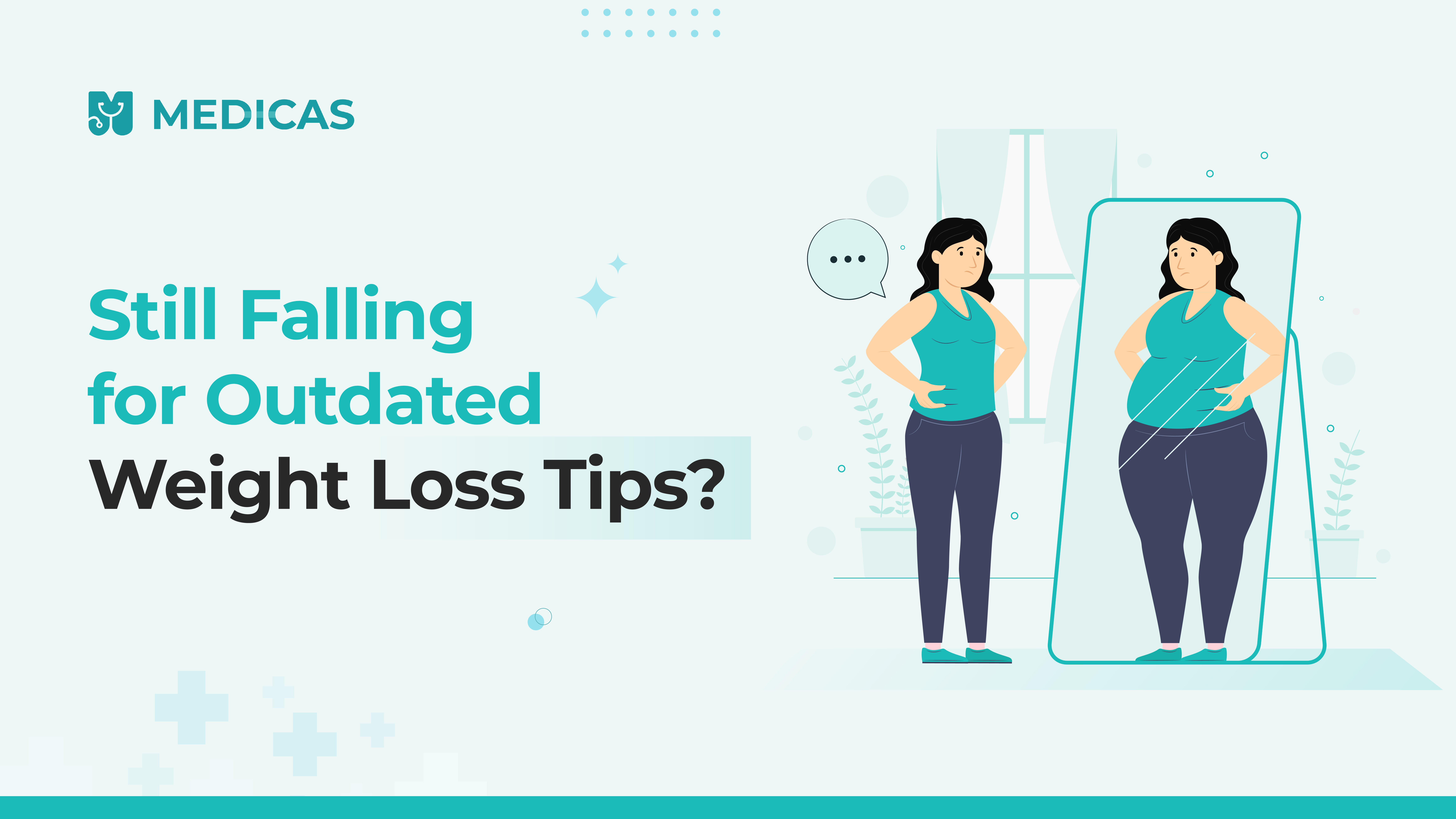Quick Links
Are you skipping breakfast or eating superfoods only to lose weight? Hold it right there! The secret weight loss hack you found online is as good as an old wives’ tale. To shed those extra kilos, you need to know facts from fiction, eat right, and sweat it out. There are no shortcuts!
Here, we’ve debunked the seven biggest weight loss myths making rounds on the internet. Let’s get started.
Myth 1: Stay Away from Carbs For Maximum Weight Loss
Reducing carb intake is one of the biggest weight loss mistakes most beginners make! Instead of focusing on carbs, limit your fat intake for healthy weight loss. Research studies have shown that an ideal mix of high protein and low carb intake is the best way to promote weight loss. Does that mean carbs don’t add to weight at all?
Well, it solely depends on your food choice. Carbs have been a staple part of the human diet since 1980. In fact, whole foods are generally high in carbs and packed with health benefits. This starkly contrasts refined carbs like sugar and grains, which lead to weight gain.
Besides, staying away from carbs for too long can lead to side effects like frequent headaches, constipation, and muscle cramps. The reason behind this is ketosis, a process where your body starts breaking fat into ketones for energy.
So, during those initial weeks of carbohydrate deprivation, when you lose a few kilos, it is actually muscle loss (and not fat). This can be extremely harmful to your health in the long run. Please consult a nutritionist/ medical practitioner before changing your diet.
Myth 2: Supplements can help you lose weight
Whether it’s about gaining or losing weight, the supplement industry is highly biased and deserves some credit for awesome marketing. With scripted TV commercials and social media ads, an increasing number of individuals are led to believe unrealistic benefits of supplements.
In reality, this is among the most popular weight loss misconceptions, as supplements have zero to minimal scientific evidence backing their claims.
Having said that, some supplements help your body lose more water, helping you look thinner. But, in the long run, it does more damage than good. Some of the long-term side effects of using weight-loss pills and supplements include:
- Increased heart rate
- Anxiety
- Insomnia
- Liver and Kidney issues
Not to forget the placebo effect of these weight loss pills, which induces over-mindful eating for people. With clean eating culture taking over, people are increasingly becoming conscious of what oil is being used, the containers they drink from, and tracking their calories. This, in turn, invites recurring episodes of depression and tension, leaving your body and mind equally affected.
Myth 3: “Low-fat” or “fat-free” options are healthier
This has got to be the most common weight loss myth ever, and we should have spread more awareness about it years ago. But sly advertising won’t let you do it just yet!
Healthy fats should always top your diet chart. But then again, fats weigh roughly nine calories per gram. So, overconsumption could be a bummer in your healthy weight loss journey. That’s precisely the reason why “low fat” food versions are winning it with people.
But wait! There’s a dark side to these products advertised as “healthier.” The majority of these products either contain added sugar or sodium. If you run the math, it actually packs more calories than regular, full-fat options. So, it’s always a wise call to stick with natural, low-fat options like veggies and fruits.
If you still want to give low-fat food options a shot, learn to read nutrition labels first. Any low-fat item that lists added sugars or sodium is a red flag. Also, watch out for the portion intake. Please consult a nutritionist/ medical practitioner before changing your diet.
Myth 4: You Shouldn’t Skip Breakfasts To Lose Weight
Studies have shown that whether you skip or eat your breakfast, it doesn’t affect your weight. However, research also suggests that people who skip breakfasts hoping to accelerate weight loss end up gaining more.
When you starve yourself in the morning, your body has enough stored glucose to sustain you for a few hours. Once it’s midday and your insulin levels are at peak, a healthy individual should feel hungry and eat more than required. Besides, people who eat their breakfast indulge in other healthy activities to balance it out, like doing yoga, working out in the gym or going for a run.
Another related weight loss myth is that breakfast can boost metabolism, and eating small meals throughout the day makes you burn more calories. It’s best recommended not to wrap your head around too much of such weight loss advice. Here’s what you should be doing instead.
- Stick to the basics and eat only when you are actually hungry.
- Never eat to pass the time or because you saw your favourite food.
- Feel free to eat your breakfast without any preconceived notions.
Please consult a nutritionist/ medical practitioner before changing your diet or eating patterns.
Myth 5: If you work out, you can eat pretty much anything and everything
Working out is definitely recommended, but that doesn’t give you the liberty to keep stuffing your stomach. Especially when you’re aiming to lose weight, it’s always best to follow a calorie deficit diet. Do you know why? Because exercise alone can never burn as many calories as you add from eating.
For example, a person eating 250 fewer calories and walking for no more than 30 minutes per day would take well over a week to lose just one pound! On the other hand, lowering your calorie intake and training more can speed up the weight loss process.
Myth 6: Cardio is the Best Way To Lose Weight
Sure, cardio is a great way to burn calories, but it isn’t the only way to shed those extra kilos. You will need to pair it with a balanced diet and strength training. That way it will help you build more muscles, boost your resting metabolic rate, and get rid of extra calories even when you’re resting. Please consult a medical practitioner/ physical trainer before you change your lifestyle.
Myth 7: Eating Late at Night Makes You Gain More Weight
Are you avoiding eating at late-night parties or invitations just because you heard this could make you gain weight? Well, that’s another weight loss myth we have debunked. It doesn’t matter what time of the day you choose to eat. What matters is how much you eat, how much activity you get during the day, and how soundly you sleep. Together, these factors can impact your weight loss journey.
People choose to eat late at night, not just because they are hungry. Sometimes, they are working, and they are tired, and they want to satisfy their cravings. It’s hard to believe, but most of us think we are hungry at night, whereas in reality, we are thirsty. So, drink some water first the next time you feel like munching late at night. If that doesn’t help, go for some healthy late-night snacks like pumpkin seeds.
The Takeaway
You see, the relationship of your body with food and exercise is way too complex. So, the majority of fitness advice and tips that you see online and hear from people are nothing but weight loss myths. If you’re serious about your fitness, always go by research and science-backed studies and steer clear of weight loss mistakes. Watch what you’re eating, take portion control seriously, and go sweat it out in the gym!
Remember, there’s never been a shortcut to weight loss, and there never will be. To learn more about how to follow a healthy lifestyle and diet, consult health and nutrition experts on Medicas.

Dr. Murali serves as the Chief Medical Officer at EGS Health, bringing over 18 years of experience as a general practitioner to his role. He also directs Special Projects & Development at the Central America Health Sciences University, Belize Medical College. Dr. Murali holds an MD and a PG Cert in Health Profession Education (HPE) and has been an active contributor to the medical field since 2001. His career began in the Tobacco Cessation Program and the Border Family Welfare Programs in conjunction with PAHO in Ciudad Juarez, where he also published research on the impact of technology on healthcare education. He later became a clinical coordinator for clerkships, forging partnerships between students and hospitals that now serve as clinical sites for the university. Dr. Murali has furthered his expertise through advanced training, including the Leaders in Healthcare Education course at Harvard Macy Institute and the Health Professions Certification Program at Keele University, enhancing his influence in both medical education and healthcare delivery, both locally and internationally.


